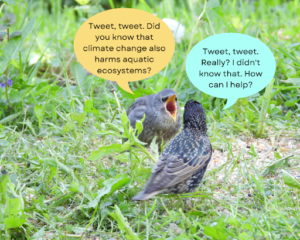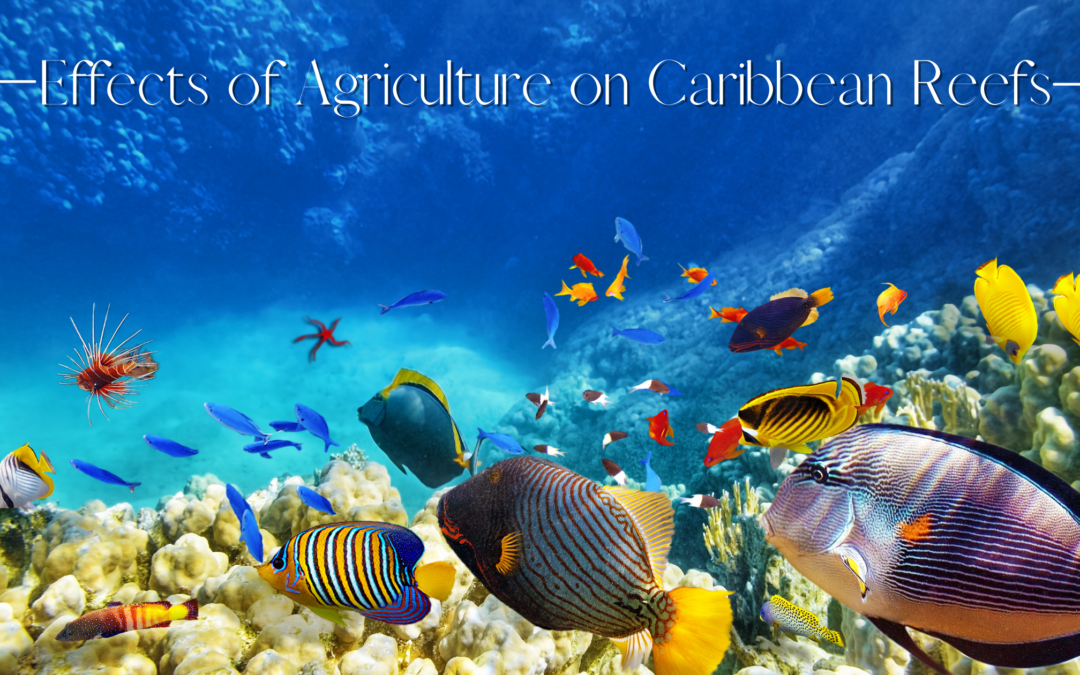Author: Alessia Carpino
Editor: Rayna Almas
Graphic Designer: Alessia Carpino
Publisher: Jumana Ismail
Often referred to as rainforests of the sea, coral reefs are some of the most diverse ecosystems on our planet and provide a home to 25% of all marine species. Five hundred million people from communities across the globe are dependent on coral reefs because they supply jobs, recreation, and protection from environmental threats. Sadly, these precious ecosystems are being destroyed by damage primarily caused by the agriculture industry. Scientists have estimated that living coral cover in the Caribbean has reduced by 60% in the past three decades because of climate change, pollution, and overfishing, causing reef degradation at a disastrous rate.

Climate Change
Agriculture is the largest industry in the world, and it generates about 25% of annual greenhouse gas emissions through food production and unsustainable practices. The increase in emissions leads to warmer temperatures on a global scale. This worsens climate change and increases ocean temperatures, which causes ocean acidification and damages coral reefs across the Caribbean region. Ocean acidification is when ocean water absorbs dangerous amounts of carbon dioxide and becomes more acidic due to the increase of CO₂ concentrations in the Earth’s atmosphere. The threat of climate change also causes infectious diseases and stress on coral, leading to coral bleaching and death.
Chemical Pollution
A significant anthropogenic (human) activity that threatens coral reefs is chemical pollution. The agriculture industry, unfortunately, releases a variety of chemicals used in agricultural development projects (ADPs). Pesticides and fertilizers from crops run off the land and into bodies of water when it rains. When these chemicals enter the water, they destroy coral reef ecosystems by harming creatures such as zooplankton, a vital organism for various species. If the population of zooplankton were to be declining, or worse, dying out in coral reef ecosystems, organisms such as krill, coral, small fish, and large whales would be severely affected. Dangerous changes in ocean acidification (pH levels) and the reduction of zooplankton for these ecosystems will not only result in negative effects on coral reefs but on the entire ocean food chain. Additionally, nitrogen from fertilizers is linked to harmful algae blooms, which causes coral bleaching and is a food source for the invasive species crown-of-thorns starfish. When an invasive species like the crown-of-thorns starfish enters the Caribbean reefs, coral cover and the total number of fish species decrease a few years after the invasive species enters the ecosystems. Algae blooms also affect animals’ ability to find food and reproduce.
Overfishing

Fish farming practices linked to agriculture contribute to the damaging impacts of overfishing. Overfishing harms over 60% of Caribbean coral reefs. Fishing above sustainable levels negatively impacts these ecosystems as it disrupts the ecological balance of the reefs. The reduction or removal of herbivorous fish due to overfishing creates an increase in the algae population which in turn reduces the coral population and harms the rest of these ecosystems. Also, overfishing large and top predatory fish species considerably decreases the number of nutrients in the Caribbean reefs, which is an important element for the health of these ecosystems. Furthermore, overfishing is closely tied to bycatch. Bycatch is when unwanted marine life is captured while people are fishing for another species. This, unfortunately, results in a loss of billions of fish and hundreds of thousands of turtles and marine mammals. Aside from the unfortunate impacts overfishing has on Caribbean reefs, depleting valuable natural resources, such as the fish species living in these coral reefs, at an unsustainable pace will not allow this resource to replenish, creating a greater risk of its extinction and consequential negative impacts on other factors of life.
Despite the unfortunate damages the agriculture industry has caused to Caribbean coral reefs, we must all guide this industry towards a path of sustainability. Society can accomplish this by reducing global reliance on pesticides, integrating agroforestry practices (planting trees in or around agricultural lands to reduce carbon emissions and combat climate change), and more. Therefore, this sector can evolve from non-environmentally friendly practices and protect the Caribbean coral reef ecosystems and the planet.
Are you wanting to make a positive change for our world and coral reefs? Here are some ways you can help:
- Be informed about the impact particular factors have on coral reefs and other ecosystems and how to help the problem. By reading this blog post, you’ve already made a positive contribution to saving the environment!
 Raise awareness and take action: Encourage others to take positive steps towards the issue you’ve learned about. Talk to your family and friends, share information on social media, plant trees to reduce fossil fuels and protect aquatic ecosystems, or even start a fundraiser to support this important cause.
Raise awareness and take action: Encourage others to take positive steps towards the issue you’ve learned about. Talk to your family and friends, share information on social media, plant trees to reduce fossil fuels and protect aquatic ecosystems, or even start a fundraiser to support this important cause. - Be a smart shopper: When buying jewelry or décor, avoid purchasing products that contain coral to save coral reef ecosystems and species that rely on this vital creature. Support reef-friendly businesses and ask or encourage businesses to contribute to coral reef conservation.
- Conserve energy: Fossil fuels contribute to ocean acidification, warmer oceans and climate change. Try purchasing energy-efficient appliances and lightbulbs and use environmentally-friendly transportation options such as walking or biking.
- Avoid using chemical pesticides and fertilizers: Rainwater can carry these dangerous chemicals and other runoff to the sea even if you don’t live near the ocean. This can harm corals directly or ignite the growth of algae which causes coral bleaching as well as the destruction of coral reef ecosystems and other species. Support local and organic agriculture to promote natural alternatives, contribute to environmentally-friendly changes in agriculture and protect coral reef ecosystems.
- Eat sustainable seafood: Sustainable seafood means that species are farmed in a particular way that ensures the long-term stability, health, and conservation of species and marine ecosystems. By consuming sustainable seafood, you’ll help save the oceans and endangered species, ensure we’ll have enough marine species in the future, eat with a cleaner conscience and eat a healthy and essential part of your diet.
- Support organizations by volunteering your time, donating, or sharing their message to others.
Fun Facts
- Coral is an animal because, unlike plants, coral cannot produce its own food through the process of photosynthesis.
- Out of 10 caught fish, 4 of them are bycatch.
- In the past century, Caribbean reefs have warmed by 0.5 to 1°C. If temperatures continuously rise in a similar manner, these aquatic ecosystems will warm further by an average of approximately 1.5°C by the year 2100.
- The primary source of protein for over 1 billion people is seafood!
Whether you work in agriculture or are someone who wants to save Caribbean coral reefs and the planet, we can all do our part to help create a healthier Earth.
Information Sources:
https://www.youtube.com/watch?v=EtW2rrLHs08
https://lisbdnet.com/explain-how-agriculture-affects-coral-reefs/
https://www.noaa.gov/education/resource-collections/marine-life/coral-reef-ecosystems
https://www.wri.org/research/reefs-risk-caribbean
https://www.bbc.com/news/science-environment-28113331
https://oceanservice.noaa.gov/facts/coral-pollution.html
https://ageconsearch.umn.edu/record/197986/?ln=en
https://oceanservice.noaa.gov/facts/acidification.html
https://wwf.panda.org/discover/knowledge_hub/teacher_resources/webfieldtrips/ecological_balance/
https://www.biologicaldiversity.org/news/press_releases/2016/corals-08-16-2016.html
https://www.sciencedaily.com/releases/2012/10/121014162914.htm
https://climatechange.lta.org/climate-impacts/coral-reef-degradation/
https://www.globalseafood.org/blog/what-is-aquaculture-why-do-we-need-it/
https://www.worldwildlife.org/threats/overfishing
https://www.caribjournal.com/2016/03/16/10-ways-you-can-help-protect-caribbean-reefs/
https://oceanservice.noaa.gov/facts/coral.html
https://seafood.ocean.org/sustainable-seafood/
https://www.sciencedaily.com/releases/2022/03/220309140933.htm
https://sustainablefoodtrust.org/articles/agroforestry/
Image Sources:
Image Created By Alessia Carpino: https://www.canva.com/design/DAE0XFuHR5k/wqpikZs1DI0aEwbDyhZYfQ/view?utm_content=DAE0XFuHR5k&utm_campaign=designshare&utm_medium=link&utm_source=publishsharelink
Image Created By Alessia Carpino: https://www.canva.com/design/DAE8OgvqJqw/4YPHf54hyRK1GNyXKC2JeA/view?utm_content=DAE8OgvqJqw&utm_campaign=designshare&utm_medium=link2&utm_source=sharebutton

